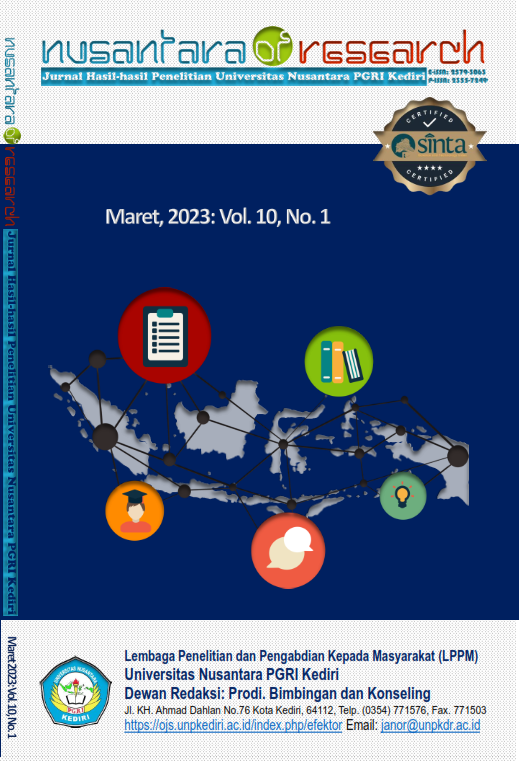The Effect of Gender Composition on the Dynamics of Group Guidance Implementation
Main Article Content
Abstract
The composition of the sex-based group is operationally defined as three groups in the guidance group which are formed homogeneously and heterogeneously based on gender, namely: the male homogeneous group, the female homogeneous group, and the heterogeneous sex group. This study aims to direct the influence of gender-based group composition in group guidance groups on group dynamics. The research was conducted through a quasi-experimental approach with a nonequivalent control group design. The research subjects were 30 randomly selected from students at SMP Negeri 1 Pungging. The One-Way ANOVA test analysis results showed a p-value (sig. 0.000), so it was known that p <0.05. These calculations prove that gender-based group composition in the guidance group has a significant positive effect on group dynamics. The implication of this finding is that guidance groups for junior high school students will be effective if they are made up homogeneously based on gender, especially the female sex.
Downloads
Article Details
Issue
Section
Authors who publish with this journal agree to the following terms:
- Copyright on any article is retained by the author(s).
- The author grants the journal, the right of first publication with the work simultaneously licensed under a Creative Commons Attribution License that allows others to share the work with an acknowledgment of the work’s authorship and initial publication in this journal.
- Authors are able to enter into separate, additional contractual arrangements for the non-exclusive distribution of the journal’s published version of the work (e.g., post it to an institutional repository or publish it in a book), with an acknowledgment of its initial publication in this journal.
- Authors are permitted and encouraged to post their work online (e.g., in institutional repositories or on their website) prior to and during the submission process, as it can lead to productive exchanges, as well as earlier and greater citation of published work.
- The article and any associated published material is distributed under the Creative Commons Attribution-ShareAlike 4.0 International License
How to Cite
References
Amanah, S., & Lisnawati, A. (2023). Upaya Mengurangi Prokrastinasi Akademik Siswa Kelas VIII menggunakan Layanan Bimbingan Kelompok dengan Teknik Self-Management di SMP Negeri 10 Kota Jambi. Journal on Education, 5(2), 2034-2043.
Apriadi, R. A. (2020). Efektivitas Konseling Kelompok Dengan Pendekatan Realitas Untuk Mengurangi Kecanduan Game online Pada Remaja (Doctoral dissertation, Untag 1945 Surabaya).
Daulay, N., Siregar, S. R., Hamidah, S., Hasibuan, N., & Widodo, F. D. (2023). Penerapan Bimbingan Kelompok terhadap Kepercayaan Diri Remaja di Desa Timbang Lawan, Bahorok. El-Mujtama: Jurnal Pengabdian Masyarakat, 3(1), 35-40.
Erlangga, E. (2017). Bimbingan kelompok meningkatkan keterampilan berkomunikasi siswa. PSYMPATHIC: Jurnal Ilmiah Psikologi, 4(1), 149-156.
Listia, Y., Darmawani, E., & Putri, R. D. (2022). Membangun Komunikasi Personal Melalui Bimbingan Kelompok Teknik Diskusi Terhadap Peserta Didik Yang Cenderung Introvert. Science and Education Journal (SICEDU), 1(2), 72-80.
Marselina, S. (2017). Analisis Layanan Bimbingan Kelompok Tentang Perkembangan Emosi Remaja Kelas X SMA Santun Untan Pontianak. Jurnal Pendidikan Dan Pembelajaran Khatulistiwa, 6(10).
Permendikbud Nomor 111 tahun 2014 tentang bimbingan dan konseling pada pendidikan dasar dan pendidikan menengah. Jakarta pemerintah Republik Indonesia.
Romlah, I., & Romlah, T. (2006). Teori dan Praktik Bimbingan Kelompok. Malang: Penerbit Universitas Negeri Malang.
Rusdiansyah, D. (2015). Pengaruh Dinamika Kelompok dan Pola Pemberdayaan Anggota terhadap Tingkat Keberhasilan Program Kelompok Tani. Studi Pustaka, 2(3).
Sugiyono, D. (2013). Metode penelitian pendidikan pendekatan kuantitatif, kualitatif dan R&D. Bandung: Alfabeta.
Sukatin, A. D., Siregar, D., & Indi Mawaddah, S. (2022). Bimbingan dan Konseling Dalam Pendidikan. Bunayya: Jurnal Pendidikan Anak, 8(2), 159-171.
Sukmadinata, N. S. (2013). Bimbingan konseling. Maestro.
Syarifuddin, S. (2019). Pengaruh Penerapan Dinamika Kelompok Dalam Guidance Courses Terhadap Kepercayaan Diri Siswa. KONSELING: Jurnal Ilmiah Penelitian Dan Penerapannya, 1(1), 19–34.
Tohirin. 2017. Metode Penelitian Kualtatif dalam bimbingan dan konseling. Jakarta: Raja Grafindo Persada.
Winingsih, E. (2022) Peningkatan Kemampuan Perencanaan Karir Pada Siswa Smp Melalui Bimbingan Kelompok Teknik Mind Mapping. Jurnal Mahasiswa Bimbingan dan Konseling. 12(6) 1216-1227.




